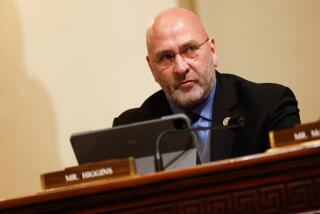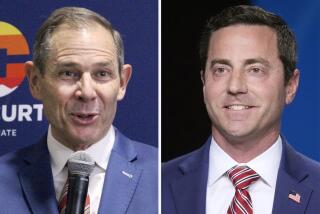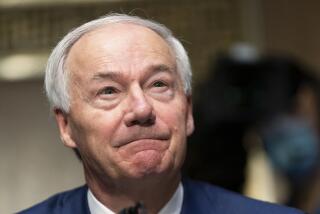Huntsman struggles to keep candidacy alive
- Share via
Reporting from Manchester, N.H. — Moments after unveiling his plan to revive the economy, Republican presidential candidate Jon M. Huntsman Jr. was crossing the grimy floor of a metalworking plant when a middle-aged man congratulated him on the speech.
“I hope this gets you some momentum,” said Cort Mendez, a Five Guys hamburger franchisee from Amherst, N.H.
The next morning, at a breakfast for political insiders, a former state GOP chairman sidled up to Mary Kaye Huntsman, who stood near her husband’s side. Quietly, he told her that Huntsman urgently needed to get some ads on TV.
So it goes for a struggling presidential contender in the first primary state: Ordinary voters know your shortcomings, and everyone has an idea about how to fix them.
But there are no easy fixes left. Huntsman attempted to stay above the fray. That didn’t work. He went on the attack, but his aggressiveness seemed halfhearted. (At last week’s debate in California, he declined to name rivals he describes as “anti-science.”) He’s repeatedly shaken up his campaign by firing staff, but that, too, has failed to revive his candidacy.
A long shot on the day he joined the presidential campaign, he has trended downward since. The boy wonder from Utah — still youthful at 51 — has led a charmed life in politics, with presidential appointments in Republican and Democratic administrations and victories in two runs for governor. But now he’s confronting something new: the possibility of failure at the very highest level.
“We’re going to win this primary,” he told 150 insiders and activists at the Politics and Eggs forum, a political institution in this state, during a recent campaign swing. In case anyone missed it, he repeated the line twice more in his 20-minute stump speech.
Huntsman, scion of a wealthy Salt Lake City family, has distanced himself from the rest of the GOP field in an effort to appeal to moderates and independents. But he seems to be hawking a product for which there is no market.
In the year of the angry voter, he’s running as the voice of civility and quiet reason, offering sunny optimism about America’s future in “this complex and confusing world in which we live.”
He’s “crazy” enough, he joked in a Twitter post sent out under his name, to believe in evolution and human-caused global warming. But his party’s core voters question climate change, and many cast doubt on evolution.
He also bears a singular, toxic credential: service as President Obama’s ambassador in China until April. That has made him unacceptable to GOP voters eager to remove the current administration and all its vestiges, and hasn’t provided much appeal to independents who question the loyalty of a guy who decided to run against his boss.
“He’s a man without a country,” remarked one top GOP official in New Hampshire.
When Huntsman appeared on NBC’s “Today” this month, he was asked, in apparent seriousness: “Are you sure you should be running in the Republican primary?”
His response — that he was “absolutely certain” — included a prediction that “this race has a long way to go.”
But Huntsman’s inability to spark greater interest among primary voters is hurting his candidacy, in the sort of vicious cycle that can make progress increasingly difficult, particularly with many contenders vying for attention.
A recent analysis by the Gallup organization concluded that Huntsman was in “the weakest position” of any 2012 candidate. He finished dead last in the seven latest national polls, averaging just 1% support. That anemic showing caused him to miss the cut for a nationally televised Labor Day candidate forum in South Carolina, a state he calls pivotal to his strategy.
In New Hampshire, he promises voters that he’ll provide “serious leadership” to plug the void in Washington, boasting that he was the only GOP candidate to “stand up” for a debt ceiling compromise. In a debate last month, though, he joined his rivals in rejecting a hypothetical deficit deal to allow $1 in higher taxes for every $10 in spending cuts.
During his recent New Hampshire swing, he faced repeated questioning about the episode and was still struggling to explain his position. After initially dismissing the debate question as “ridiculous,” he now calls it fair but adds that it’s “absolute nonsense” to expect that sort of deal “in the real world.”
Huntsman’s matinee looks, progressive stance on environmental protection and support for gay civil unions made him — at least on paper — a potent presidential possibility, with appeal to the independent voters who decide national elections. But the Republican Party he returned from China to lead was different from the one he had left behind — less inclined to accept views like his, for one thing.
Huntsman and his New Hampshire supporters play down his struggles by arguing that summer is a tough time to engage voters, though he has certainly tried.
“What we want to do is get people to listen to him,” said Peter Spaulding, his state campaign chairman. “He’s a very intelligent, very articulate guy.”
What he lacks, say unaligned Republican politicians, is fire. Former state Republican Party Chairman Fergus Cullen, who played host to Huntsman at his Dover, N.H., home this summer, said Huntsman’s failure to connect may stem from his discomfort with drawing sharp contrasts.
“For example, if you say that it’s time to pull out of Afghanistan” — as Huntsman does, in passing, during his stump speech — “you’ve really got to say it more clearly. I think he’s been a little hesitant about drawing those distinctions,” Cullen said.
The campaign calendar is daunting for Huntsman, who lacks ties to evangelicals in the early states of Iowa and South Carolina, making New Hampshire all-important for him. A newly formed “super PAC” with links to the family empire back in Utah — where Huntsman’s billionaire father has already spent large sums to advance his son’s presidential ambitions — appears poised to unleash a TV ad campaign on his behalf.
Inevitably, those ads will focus on the “Live Free or Die” state, where voters must start warming to Huntsman soon if his candidacy is to continue.
“As New Hampshire goes, I think, the rest of the country will go. It starts here,” he told reporters recently. For Huntsman, this could also be where it ends.
More to Read
Sign up for Essential California
The most important California stories and recommendations in your inbox every morning.
You may occasionally receive promotional content from the Los Angeles Times.










